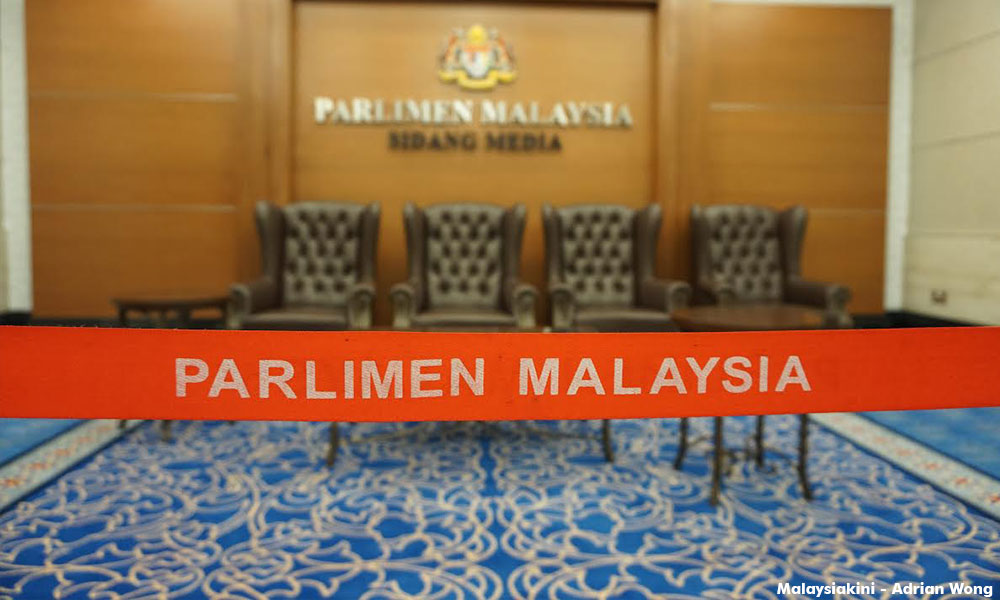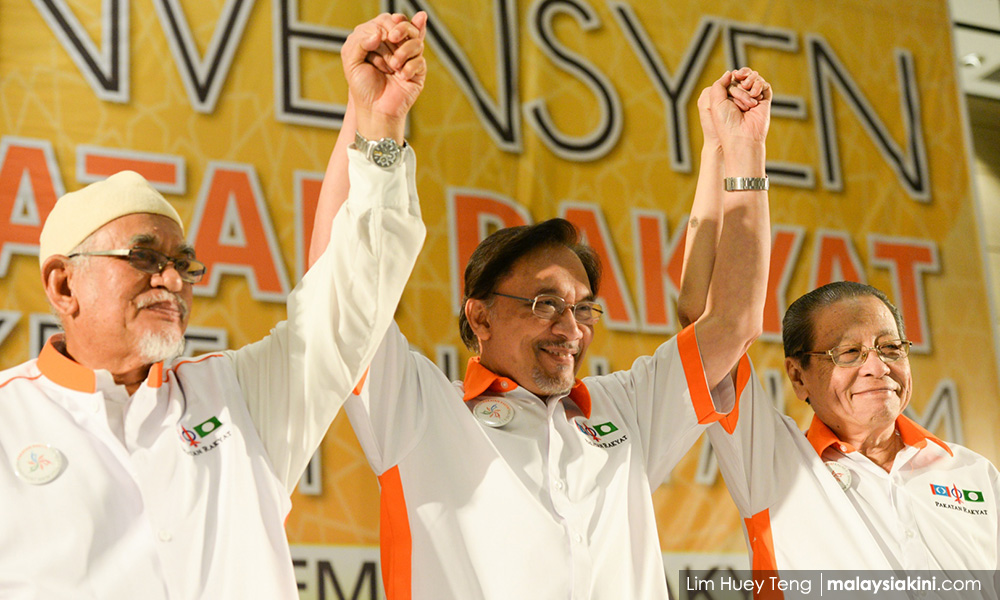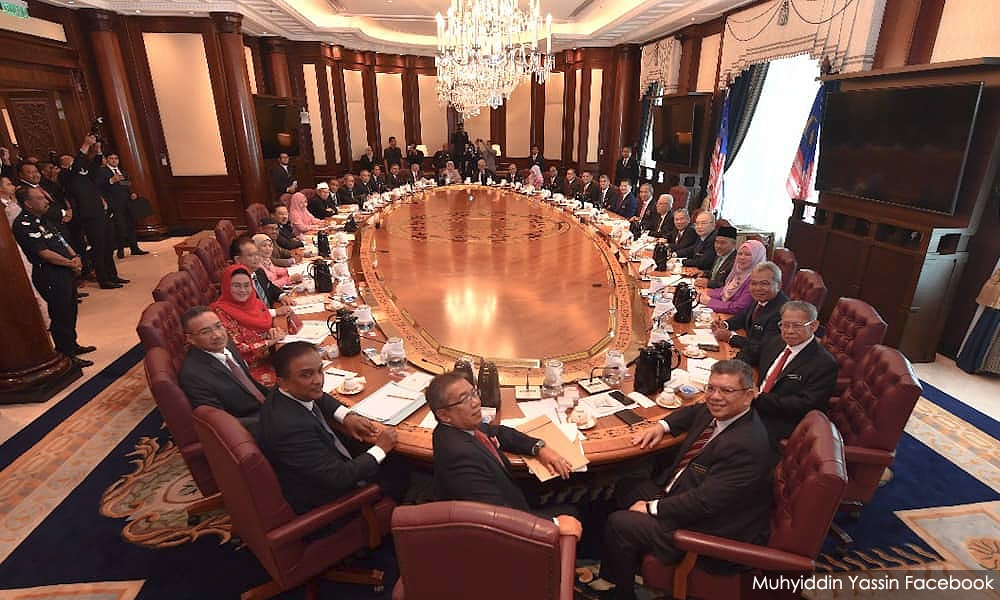Malaysiakini:
COMMENT | Who should be the next parliamentary opposition leader?
by Wong Chin Huat.
COMMENT | That is the wrong question to first ask. If you instead believe that this is the first or the only question to ask and you already have the answer, please don’t waste your time reading this article.
The first question we should ask is what can a parliamentary opposition leader do? And the answer should not be “so that he can be the prime minister (PM) for the third time or the first time”.
The parliamentary opposition leader in a parliamentary democracy is meant to organise the main opposition as the government’s shadow. That’s why his/her place inside the parliamentary chamber is exactly the opposite of the PM.
His/her job is to stand by to take over the PM’s job if the latter loses the next election or loses a vote of confidence or supply and he/she can assemble a working majority.
He/she does not standby by believing that the country or economy will collapse without him/her or by having harboured that ambition for decades.
A parliamentary opposition leader shadows the PM, with his/her senior colleagues shadowing the ministers.
That’s the idea of a shadow cabinet, common in Westminster systems but denied in Malaysia.
The functions of a shadow cabinet
A shadow cabinet serves two functions - first, division of labour by ministerial portfolios and secondly, division of opposition parliamentarians into frontbench (shadow ministers) and backbench.
Creating two leagues of opposition parliamentarians helps to professionalise the opposition. When everyone is on the frontbench, there is no more frontbench.
However, the reason why some parliamentarians must be kept in the second league (backbench) in their own party or coalition is different for the government and opposition.

For the government, if everyone is on the frontbench, i.e. becoming part of the payroll vote, then the government will face no check and balance from within its parliamentarians, and the government – if it holds a simple majority – can become an elected dictatorship of the PM.
The opposition has no payroll vote to corrupt the entire parliamentary system. Why can’t we allow all opposition MPs to feel that they are ministerial materials?
First, size matters. Effectiveness decreases when a core group goes from 20 to 100.
Second and most importantly, the opposition needs internal competition to be collectively strong – some must lose for others to win, so both would work hard, for the winners to stay where they are and the losers to replace the incompetent winners.
The logic of promotion and relegation is similar for Westminster parliamentary parties and English football, except the former doesn’t have regular matches. Only 20 top football clubs get into the Premier League (the first tier) while the next 24 teams stay in the EFL Championship (the second tier).
In a functioning Westminster Parliament, ambitious backbenchers in both the government and opposition work hard to shine in the House so that they get noticed and may become ministers or shadow ministers in the next reshuffle of the frontbench.
How the Malaysian Parliament fails us
In that sense, the ultimate reason we have parliamentarians busy grabbing executive jobs – as heads of government agencies or government-linked companies if they can’t get the post of a minister or deputy minister – but not performing is not because they are greedy, power-crazy or not putting the people’s interest first.
Cut all those moralist clichés. Modern politics doesn’t work on having saints to do the job. It works on mechanisms and incentives so that even crooks have to do good if they want the job.
The fumbling and infighting of Pakatan Harapan ministers were not because they intentionally blew it. It was simply because most were not trained to be ministers and there was no healthy mechanism to manage portfolio and personality conflicts.
It wasn't only that the opposition never won power until 2018, they never had a real shadow cabinet too.
It might be difficult when the opposition had only 20 out of 219 parliamentarians, as in the 11th Parliament (2004-2008).
The first question we should ask is what can a parliamentary opposition leader do? And the answer should not be “so that he can be the prime minister (PM) for the third time or the first time”.
The parliamentary opposition leader in a parliamentary democracy is meant to organise the main opposition as the government’s shadow. That’s why his/her place inside the parliamentary chamber is exactly the opposite of the PM.
His/her job is to stand by to take over the PM’s job if the latter loses the next election or loses a vote of confidence or supply and he/she can assemble a working majority.
He/she does not standby by believing that the country or economy will collapse without him/her or by having harboured that ambition for decades.
A parliamentary opposition leader shadows the PM, with his/her senior colleagues shadowing the ministers.
That’s the idea of a shadow cabinet, common in Westminster systems but denied in Malaysia.
The functions of a shadow cabinet
A shadow cabinet serves two functions - first, division of labour by ministerial portfolios and secondly, division of opposition parliamentarians into frontbench (shadow ministers) and backbench.
Creating two leagues of opposition parliamentarians helps to professionalise the opposition. When everyone is on the frontbench, there is no more frontbench.
However, the reason why some parliamentarians must be kept in the second league (backbench) in their own party or coalition is different for the government and opposition.

For the government, if everyone is on the frontbench, i.e. becoming part of the payroll vote, then the government will face no check and balance from within its parliamentarians, and the government – if it holds a simple majority – can become an elected dictatorship of the PM.
The opposition has no payroll vote to corrupt the entire parliamentary system. Why can’t we allow all opposition MPs to feel that they are ministerial materials?
First, size matters. Effectiveness decreases when a core group goes from 20 to 100.
Second and most importantly, the opposition needs internal competition to be collectively strong – some must lose for others to win, so both would work hard, for the winners to stay where they are and the losers to replace the incompetent winners.
The logic of promotion and relegation is similar for Westminster parliamentary parties and English football, except the former doesn’t have regular matches. Only 20 top football clubs get into the Premier League (the first tier) while the next 24 teams stay in the EFL Championship (the second tier).
In a functioning Westminster Parliament, ambitious backbenchers in both the government and opposition work hard to shine in the House so that they get noticed and may become ministers or shadow ministers in the next reshuffle of the frontbench.
How the Malaysian Parliament fails us
In that sense, the ultimate reason we have parliamentarians busy grabbing executive jobs – as heads of government agencies or government-linked companies if they can’t get the post of a minister or deputy minister – but not performing is not because they are greedy, power-crazy or not putting the people’s interest first.
Cut all those moralist clichés. Modern politics doesn’t work on having saints to do the job. It works on mechanisms and incentives so that even crooks have to do good if they want the job.
The fumbling and infighting of Pakatan Harapan ministers were not because they intentionally blew it. It was simply because most were not trained to be ministers and there was no healthy mechanism to manage portfolio and personality conflicts.
It wasn't only that the opposition never won power until 2018, they never had a real shadow cabinet too.
It might be difficult when the opposition had only 20 out of 219 parliamentarians, as in the 11th Parliament (2004-2008).

But this excuse no longer stands for the 12th, 13th and 14th Parliament, when the largest opposition bloc had, respectively, 82 Pakatan Rakyat (PR) parliamentarians, 89 (PR until 2015), 53 (BN in September 2018) and 92 (Pakatan Harapan) after February 2020).
For the record, PR announced in July 2009 a list of 82-member “shadow parliamentary committees” but categorically denied it being a shadow cabinet.
In September 2020, BN announced Malaysia’s inaugural shadow cabinet at the federal level, with 52 members - only former prime minister Najib Abdul Razak was left out.
But both did not function as a shadow cabinet.
First of all, there were no backbenchers. For PR, every ministry was shadowed by one MP from PKR, PAS and DAP, and the PM's Department was shadowed by 18 MPs from all three parties, but none was named as shadow ministers. For BN, 27 were named shadow ministers and the remaining 25 deputies.
Second, the shadow ministers or committee members didn’t see themselves as shadowing the government. The cabinet has weekly meetings, but have you ever heard of a shadow cabinet meeting?
Check and balance on the executive by a Westminster Parliament is carried out by the government backbenchers and the opposition. It is bad enough when government backbenchers are aggressively bought over with political appointments, but is the opposition doing their best?
While sacking a PM, approving a budget, approving law and asking “parliamentary questions” all need Parliament to be in session, what opposition parliamentarians generally do in parliamentary debates – pointing out the government’s mistakes and weaknesses, and offering alternatives – can be done outside of the Parliament.
Where public opinion is concerned, a functioning shadow cabinet that meets every week can certainly fail Muhyiddin’s cynical gimmicks of a one-day Parliament. This is what Harapan should be doing, instead of asking for an extension to a comical two days.
Shadowing PN ministers?
The entire opposition now has 109 MPs - 92 from Harapan, nine from Warisan, five from Mahathir’s Bersatu bloc, one each from UPKO and PSB, and one independent.
What do they do if Parliament is in recess for another five months after May and is only reconvened to pass the new budget in October? Would doing nothing be fair to taxpayers? Shouldn’t they be shadowing the Perikatan Nasional (PN) ministers whom they have generally condemned as incompetent and unworthy?

Prime Minister Muhyiddin Yassin has proliferated ministerial portfolios from Harapan's 27 to 33. Nevertheless, most portfolios can be shadowed by ex-frontbenchers who are still in the opposition, except for three ministries where the ministers had defected and two newly-created portfolios in the Prime Minister’s Department.
Should the former frontbenchers stick to their designated portfolios? Who should fill up the vacancies caused by defection and death? This can be answered at two levels - Harapan as the largest opposition bloc, and the wider opposition including Mahathir’s bloc and Warisan.
By the so-called conventional wisdom in Malaysian politics, a shadow cabinet is a "no-no" for the opposition.
It tells who among the members of Parliament are recognised as ministerial materials and who are not (and therefore can consider jumping to the government). It also allows smear campaigns on which parties are dominant and which parties are marginalised. But ultimately, it gives a sense of certainty so one cannot entice government MPs to jump with wild promises.
So, why should Harapan or the wider opposition brave the troubles to form a shadow cabinet?
Because all problems that would pop up in forming a shadow cabinet will pop up in forming a government. If you are not prepared to take the heat, how do you survive the kitchen?
What we need is professionalised politics, not fairy tales like talk of "putting politics aside".
Bad politics is like cancer. Even amidst Covid-19, wearing a face mask and washing hands do not make smoking okay.
Mahathir or Anwar, whoever becomes the parliamentary opposition leader must lead with a shadow cabinet. The opposition needs a collective leadership, not any more personal cult.
WONG CHIN HUAT is an electoral system expert at Jeffrey Sachs Centre on Sustainable Development, Sunway University. He also leads the clusters on electoral systems and constituency delimitation as part of the government’s Electoral Reform Committee (ERC)

y need opposition when we hv a backdoor govt? a backdoor govt is only accountable to whoever that pick them. tis is govt model imspired by ccp, which most ccp lover proudly endorsed.
ReplyDeleteBy convention the opposition party that has the most seats should be offered the post of opposition leader, so Guanee or LKS will do, ha ha ha....why must it be Anwar or Toonsie....or are we till stuck in the racial convention?
ReplyDelete